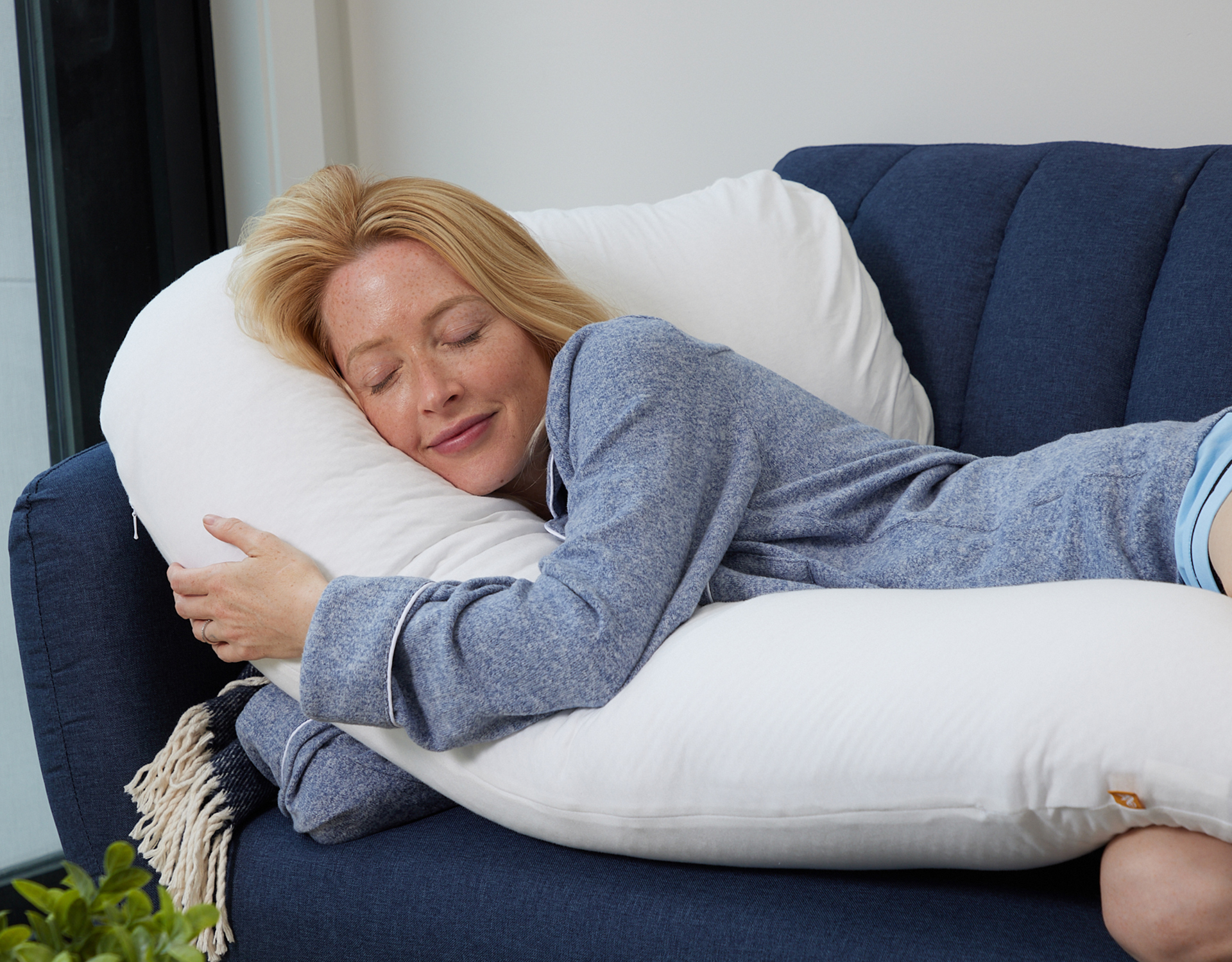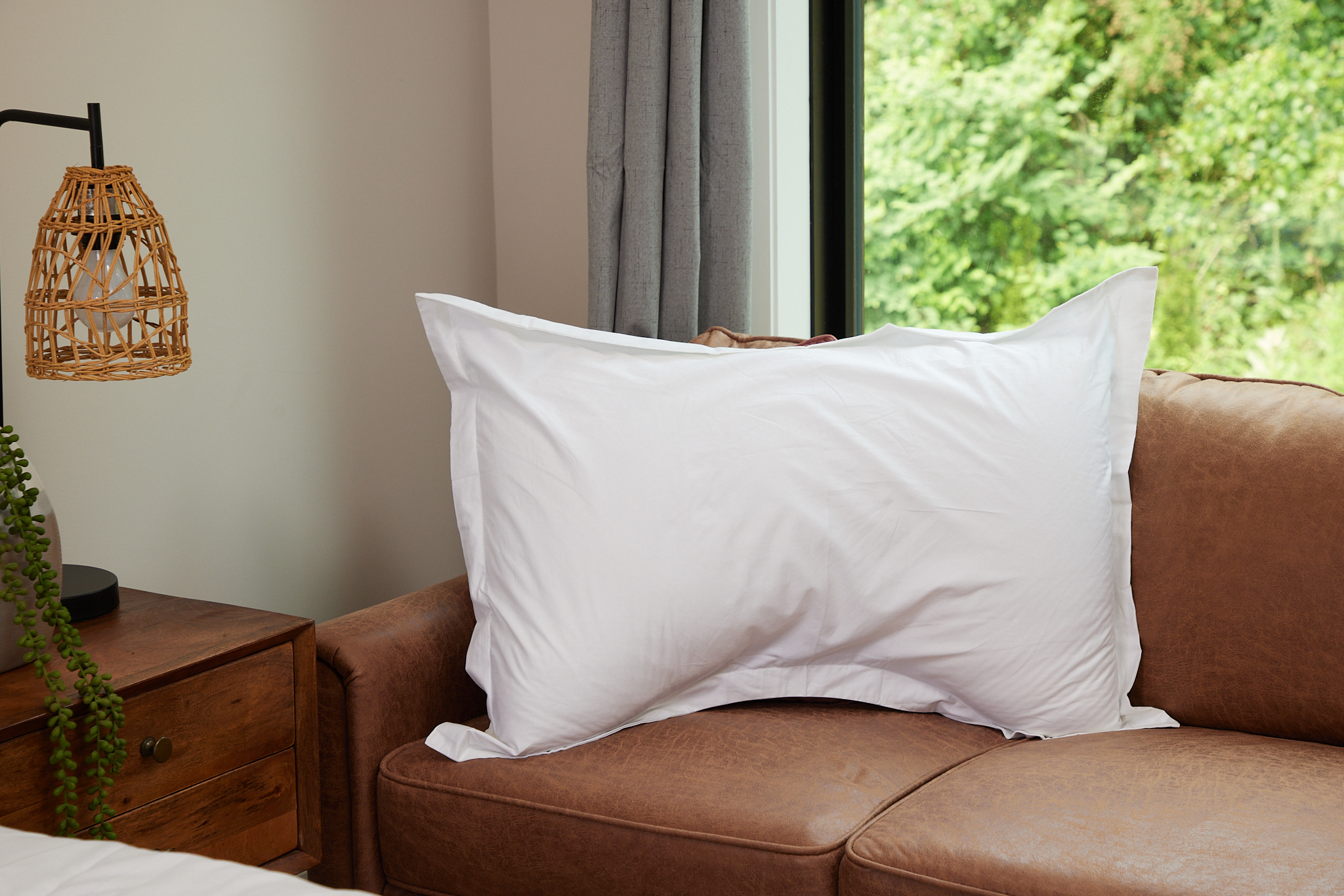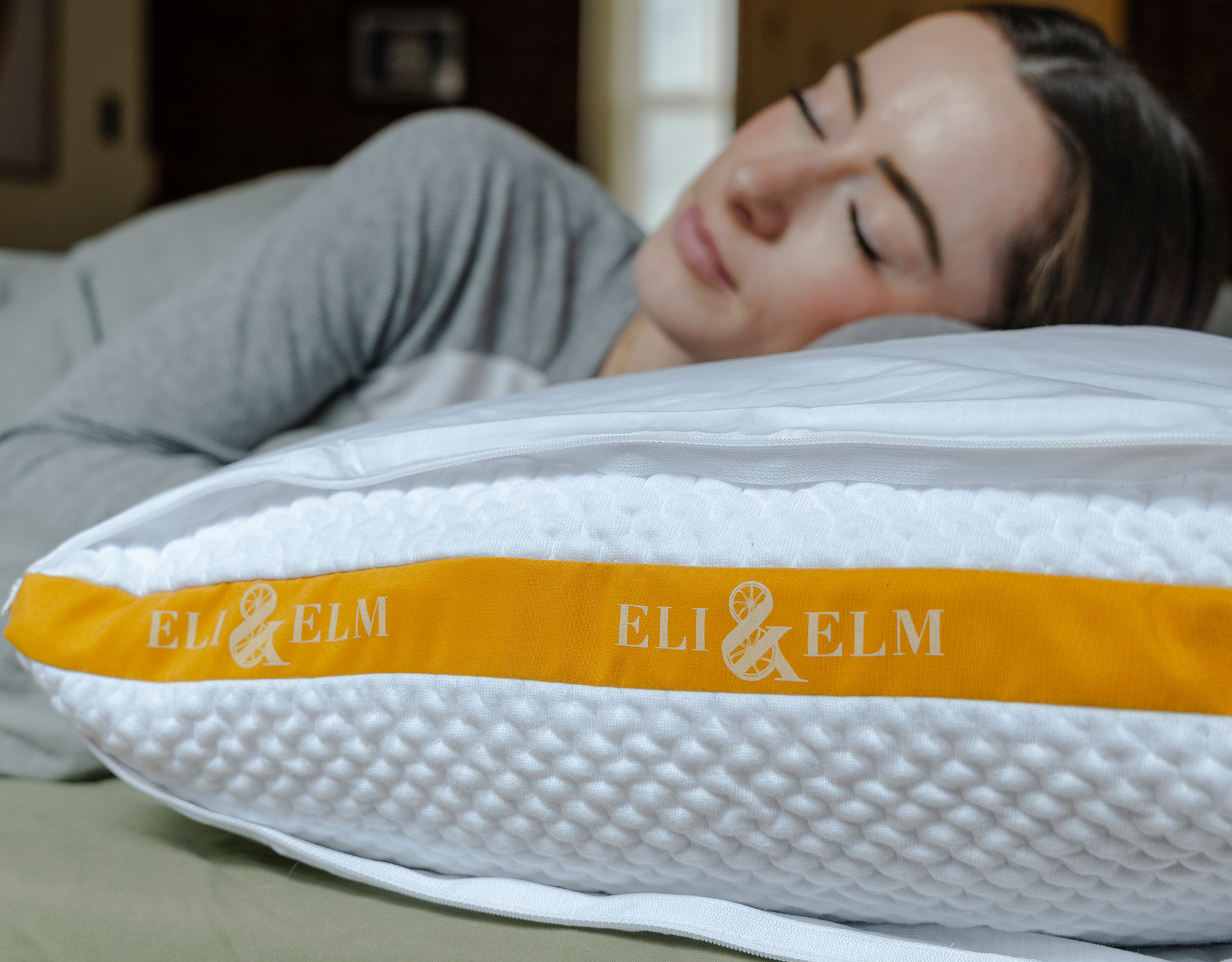Is lying face down in bed your preferred method of falling asleep? If it is, you can sigh for relief as you are not the only person who enjoys resting in this position. The positively inclined state beats the wish to lie on the stomach but does not pass the neck, shoulder, and lower back strain issues.
But what if we told you that making a few changes to your pillow and mattress could improve your stomach's sleep? In this blog post, we'll discuss the benefits of using a pillow while sleeping on your stomach and give tips on finding the perfect pillow for your sleeping position.
Is Stomach Sleeping Good or Bad?
We all may have different preferences when it comes to sleeping positions. While some individuals feel more comfortable resting on their sides or stomachs, others would rather sleep on their backs. There are differing views on the impact of stomach sleeping on human health.
On the one hand, the stomach sleep position is comfortable and relaxing for many people. Sleeping on the belly reduces lower back tension, corrects back wracking, and swelling hissing freedom of speech. You may also be interested in snoring and sleep apnea problems. It may also be viable if you experience less acid reflux and have improved digestion.
Health Concerns for Stomach Sleepers
Sleeping on your stomach might be unhealthy in many other ways, too. The main disadvantage is stressing the neck and shoulders. Feeling the neck and head "rigor mortis" is easy if you sleep deeply.
When you are asleep, your neck and head are turned to the same side continuously, which makes it hard for the neck to turn, and it may become sore and stiff. Besides squeezing your chest and lungs, breathing is difficult when lying on your stomach, which could just make you even more tired.
Moreover, resting on your stomach leads to wrinkles, particularly around the eyes. Continuous pressure on the facial region is the leading cause of wrinkles and fine lines that appear through the twisting and extension of the skin fibers. Relocating your sleeping position will be suitable if you want to be wrinkle-free and have the desired youthful look.
Another thing to consider is that pregnant women may experience difficulties with stomach sleeping. Sleeping on the stomach becomes increasingly uncomfortable as the belly grows and can pressure your baby.
Pregnant women are advised to sleep on their sides to ensure good blood circulation to the unborn baby. Try Eli & Elm’s pregnancy body pillow for a comfortable and pain-free journey towards motherhood.
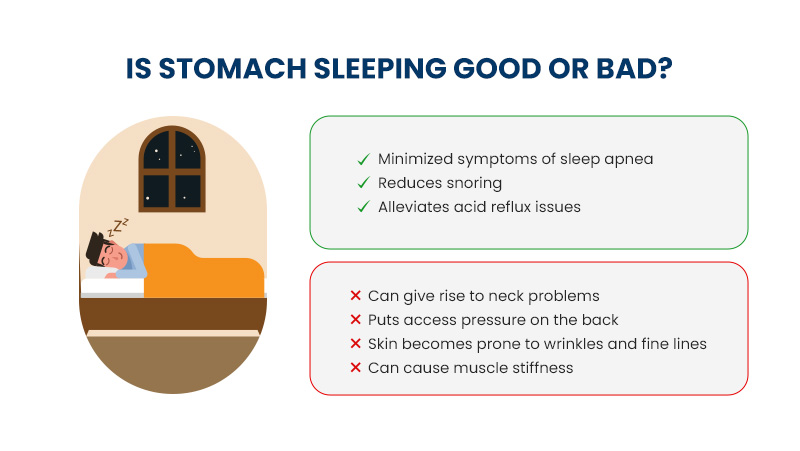
How Does Stomach Sleeping Affect Your Back and Neck?
Many people who sleep on their stomachs feel pain of some kind. The discomfort in your joints, neck, or back might affect your ability to sleep. You will likely wake up during the night and feel uneasy and tired in the morning with discomfort at night.
According to many studies, stomach sleeping puts significant pressure on your spine. This is because the center of your body bears most of your weight, making it quite difficult to sleep, and eventually, your spine becomes misaligned.
In addition, when the spine is unbalanced, other body parts become more stressed. Furthermore, spinal tension can result in discomfort virtually anywhere in the body because the spine is a nerve conduit.
Typically, when you sleep in the usual position on your stomach, you must turn your head to one side and hold it there. Otherwise, you can breathe if you have somehow breathed through the pillow.
As a result of the dislocation of your head and spine, your head can be twisted in the process. Although you can be ignorant of the harmful consequences within one night of lying on your stomach with your neck in the wrong position, neck issues may become a persistent problem.
A herniated disc is one of the neck-related problems that make one feel sick. It occurs because the jellylike disk between your vertebrae starts to break apart. Alternatively, the gel that pokes out of the disk may pinch the nerves, leading to inflammation.
How Does a Pillow Affect Stomach Sleepers?
Stomach sleeping is the most typical position for many people. The research found that almost 16% of adults are stomach sleepers. It can be excellent for some people, but it can also be harmful to the body if it is not adequately supported. One key factor that can affect stomach sleepers is their choice of pillow.
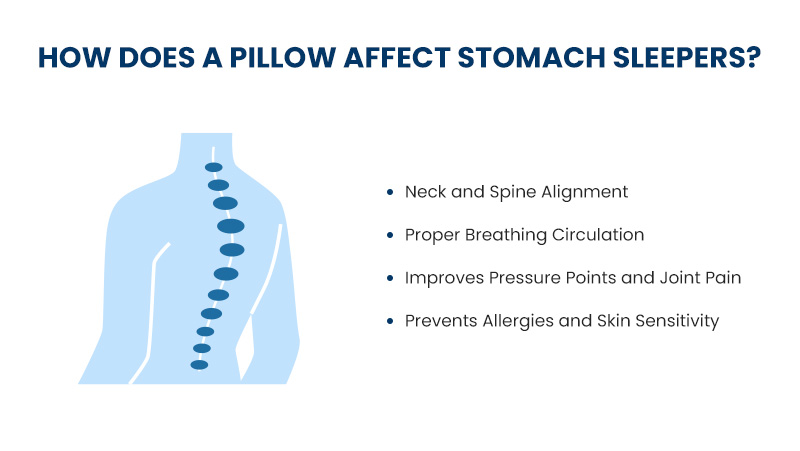
Best Pillow for Stomach Sleepers
It can be very difficult, if not impossible, to have the best neutral position for the head and spine when you are lying down and facing your face. There may be better sleeping positions for some people. If you want to sleep on your stomach, you should avoid snoring or clogged noses. Your pillow is too soft and not supportive enough to help you sleep better.
We found some great pillows for tummy sleepers, purposely made for individuals who sleep on their stomachs. Our next move was to talk with experts in sleeping matters to identify the best shapes, firmness levels, and filling amounts of such pillows.
Now, let’s delve into how pillows affect stomach sleepers and which types suit their sleeping styles.
Neck and Spine Alignment
All sleep positions require correct neck and spine alignment. When lying on one's stomach, the neck and spine are not supported for the standard curves, leading to pain. Turning their heads to the side overstretched, most stomach sleepers’ necks and shoulders.
People who sleep on their stomachs should use the right pillow to relieve these aches and pains. Such a pillow must be flat and soft enough to keep your head and neck relatively neutral. This is important because it will ensure they wake up without any signs of headache, stiff neck, or backache due to poor postural sleep habits.
Best pillow: a flat and soft pillow
Best for: neck, shoulder, and spine alignment
Breathing Difficulties
Have you ever wondered whether your breathing issues might arise from the wrong pillow you use? Well, here is the answer: It does help! However, if you are on your belly, the upper front of your head will be on top of it, making it difficult for air to reach your lungs. This is a prevalent issue for people with respiratory problems like asthma or even people with sleep apnea.
Moreover, using a thick or hard pillow can worsen this condition since it forces one’s face further into it. Thin pillows are best for people who sleep on their stomachs since they do not cause breathing blockages and ensure that you have a nice sleep throughout the night.
Best pillow: a thin and soft pillow (latex pillow)
Best for: proper respiratory cycle while sleeping
Pressure Points and Joint Pain
Lying on your stomach without good support may lead to joint pain through pressure point buildup. When you lay down on the bed, your body's weight is distributed unevenly, thus causing some parts like hips, shoulders, and knees to hurt even more if you have previous joint problems.
People who sleep on their stomachs need pillows that support these points correctly. You can solve this by getting a soft pillow flatly stuffed with down/feather, memory foam, or cervical pillows. Putting a pillow between the legs while facing down the pelvic area and spine can draw off the pressure evenly by placing a pillow between the legs while facing down.
Best pillow: thinner pillow with a softer filling (down or memory foam)
Best for: easing pressure on the hips and lower back
Allergies and Skin Sensitivity
While not so common, what kind of pillow a stomach sleeper uses can also lead to allergies and skin sensitivity. Dust mites and other allergens can be harbored by standard pillows, especially those made from synthetic materials that could make allergic people uncomfortable. They may also cause redness and itching on sensitive skin.
Sleeping on hypoallergenic pillows made of natural materials such as cotton, bamboo, or wool is a good idea if you suffer from allergies or skin sensitivity. These pillows are air-permeable, dust mite-resistant, and soft on your skin, so you can healthily enjoy restful sleep.
Best pillow: natural pillows like cotton, bamboo, or wool
Best for: gentleness on the skin, preventing allergies
Types of Stomach Sleeping Positions
Although stomach sleep positions change depending on individual comfort and habits, the prone, fetal, and soldier positions share specific resemblances.
Freefall Position
In this position, you are faced on the bed with one arm wrapped around or below your pillow, and one head turned sideways. The analogy of free-falling is present, and hence, the term.
Starfish Position
In addition to lying on their stomachs and lifting their arms near their heads or laying with one arm under the pillow or a starfish, people might do that which is not a stomach sleeping position.
Fetal Position
Some stomach sleepers might adopt a fetal position, where they curl their body into a slightly curved shape, knees drawn up towards the chest, and head turned to the side. Placing a pillow under the pelvis is one way that stomach sleepers help maintain the spine’s natural curve, which can alleviate lower back pain for some people.
Arm under the pillow
This entails tucking one arm beneath it while letting the other lie beside the body or on the mattress.
Leg bent
In this stance, one may have one leg slightly bent at its knee joint and keep another straighter depending on how they feel most comfortable.
Legs apart
Many front sleepers find that sleeping with their legs spread wide apart gives them more stability during sleep.
Tips to Sleep on Your Stomach Safely
The most comfortable way for many people to sleep is to lie face down or stomach sleep. However, face-down sleeping can do more damage than good to the frame of the people who adopt this sleep posture. Here are some guidelines for you that will allow you to sleep on your stomach safely:
1. Use a flat and firm pillow
Stomach pillows are a must for stomach sleepers. A challenging, flat pillow will better align your head and neck and help prevent strained neck muscles. A soft or high pillow may bend your neck into an uncomfortable position, leading to stiffness and pain in the morning.
2. Keep your spine aligned
One primary concern is that sleeping on your stomach may cause a spine misalignment. Try putting a pillow under your lower abdomen or pelvis to prevent this. This would keep the spine more neutral and support the lower back. Additionally, consider using a body pillow to hug, which can help your spine and prevent it from twisting or bending uncomfortably.
3. Avoid using your arms as a pillow
Many people love resting on their stomachs using their arms as head support, but this can be painful because it stresses the shoulders too much. If you need more comfort, put a small pillow under your elbows.
4. Consider a supportive mattress
Every sleeper needs a good mattress, but those who sleep on their bellies do exceedingly so. To keep your body upheld and your spine aligned during sleep, go for a firm mattress; it’s possible that with a soft one, your body may sink in too deep, causing more pressure on joints and muscles.
5. Stretch before bed
Before bed, stretch so you don’t wake up with a sore back or neck. This will relax your muscles and get you ready for sleep. Concentrate more on the back, neck, and shoulder stretches since these are the ones that might feel tight after sleeping on your stomach the whole night.
6. Consider changing your sleeping position
If every morning brings neck or back pain into your life, it’s high time we consider changing our sleeping positions. Health-wise, you may find it better for your spine to be well placed if someone lies on their sides or back while asleep because of its natural alignment. Suppose you like sleeping on your belly yet want to give your body some relief and prevent long-term pain; alternate between different positions.
7. Be mindful of your breathing
Breathing might get more complex if you lie with your face on the pillow while sleeping on your stomach. Try tilting your head slightly to the side instead of downwards in order not to block off this. Doing so will provide better air circulation and dodge shoulder or neck pain.
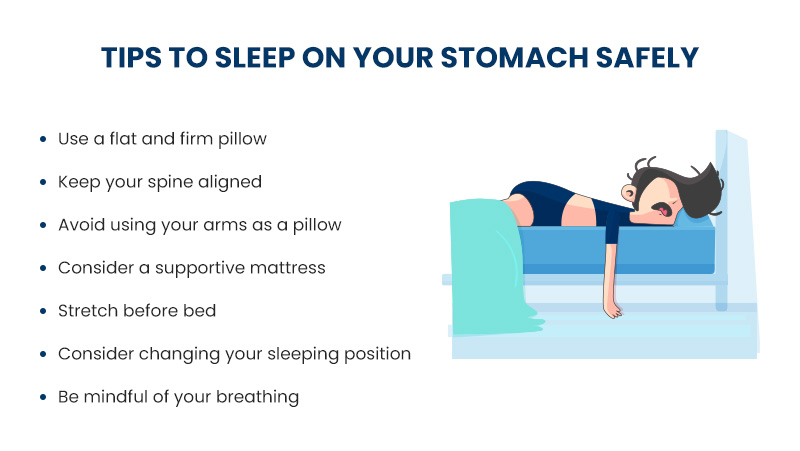
How to Change Your Stomach Sleeping Habit?
Changing your sleeping posture will do a lot for your neck and spine. The first easiest step for the stomach-sleeping person to turn to the side is simple. The fact is that the tendency of the majority of front sleepers is already inclined to be on their sides.
Learn these tips to stop the stomach and start sleeping on your side. Break it down into stages.
- First, roll on your side for 20 minutes, even if it is difficult, and gradually start doing it regularly for a month or two until you get used to it. You may prefer to progress as you feel comfortable.
- Start switching up the side you sleep on. Alternate the side you lie on or the side of your face that contacts the pillow, depending on whether you become a full-fledged side sleeper or are still too devoted to stomach sleeping to give it up.
- If you cross one leg over the other to "force" your hips into alignment, try placing a pillow between your knees and ankles. You will be a side sleeper in no time!
- If you're still having trouble, pick up another pillow and hug it before you. This will prevent you from rolling onto your front at night.
- Give yourself a fantastic sleeping experience and get Eli & Elm’s cooling side sleeper pillow.








